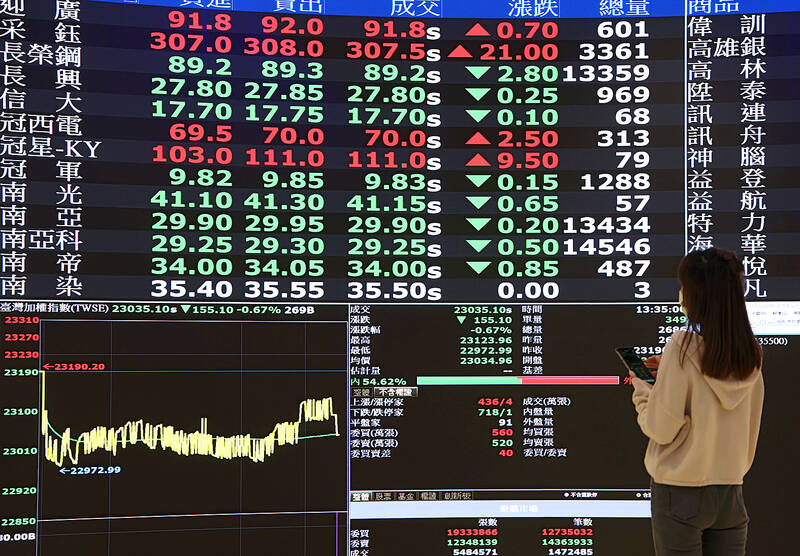Global index provider MSCI Inc yesterday announced it would increase Taiwan’s weighting across three key indices, as local shares perform well, driven by the artificial intelligence (AI), semiconductor and high-tech sectors.
Taiwan’s weighting in the MSCI All Country World Index is to rise by 0.02 percentage points, while it is increase by 0.14 percentage points and 0.13 percentage points in the MSCI Emerging Markets Index and the MSCI AC Asia ex Japan Index respectively, it said.
Following the adjustments, which are to take effect after the end of trading on Feb. 27, Taiwan’s weightings in the indices would rise to 1.96 percent, 20.16 percent and 22.89 percent respectively, it said.

Photo: CNA
The quarterly adjustments reflect price changes in component stocks and do not necessarily suggest capital movements in the market, the Taiwan Stock Exchange said in a statement.
However, the indices serve as market performance monitors, offering insights into Taiwan’s economic and industrial trends, it said.
The heavily tracked indices would also tweak the MSCI Taiwan components.
It would add printed circuit board supplier Elite Material Co (台光電) and Lotes Co Ltd (嘉澤), which makes connectors and other electronic components.
It would remove DRAM chipmaker Nanya Technology Corp (南亞科技) and Walsin Lihwa Corp (華新麗華), a maker of cold finished bars, it said.
Stocks added to MSCI indices would undergo a short-term price surge due to increased buying pressure from index-tracking funds. Stocks removed might experience selling pressure as funds adjust their portfolios. The total number of MSCI Taiwan stocks remains unchanged at 88.
MSCI also said it would trim the weighting of Taiwan Semiconductor Manufacturing Co (TSMC, 台積電) by 0.3 percentage points to 54.57 percent, as share prices in the world’s chipmaker soared more than 80 percent last year.
Likewise, the weighting of chip designer MediaTek Inc (聯發科) would slide after a 52 percent spike in the share prices last year.
Fubon Securities Investment Services Co (富邦投顧) chairman Edward Chen (陳奕光) said the adjustment would have little influence on TSMC as the chipmaker remains Taiwan’s largest MSCI component and has firm support of major passive mutual funds, including Taiwan’s labor insurance and pension funds.
Cathay Futures Consultant Co (國泰證期) analyst Tsai Ming-han (蔡明翰) said the MSCI adjustments would benefit the local exchange when global investors cut exposure to riskier markets and seek stable and high-tech-focused economies.
With AI demand rising, more institutional investors would want exposure to Taiwan’s leading chipmakers, Tsai said.
In contrast to the increase of Taiwanese equities’ weighting by MSCI, the index compiler further trimmed Chinese stocks from its global benchmarks, underscoring the market’s diminishing appeal among investors despite a recent rebound.
MSCI said it would cut 20 stocks from the MSCI China Index, following more than 200 removals last year, while eight new constituents would be added.
The changes would also apply to the MSCI All Country World Index, it said.
Among other notable changes, MSCI removed 11 stocks from the MSCI Korea Index, while adding none. It culled nine from Japan and added one.
Additional reporting by Bloomberg

Three experts in the high technology industry have said that US President Donald Trump’s pledge to impose higher tariffs on Taiwanese semiconductors is part of an effort to force Taiwan Semiconductor Manufacturing Co (TSMC, 台積電) to the negotiating table. In a speech to Republicans on Jan. 27, Trump said he intends to impose tariffs on Taiwan to bring chip production to the US. “The incentive is going to be they’re not going to want to pay a 25, 50 or even a 100 percent tax,” he said. Darson Chiu (邱達生), an economics professor at Taichung-based Tunghai University and director-general of

‘LEGACY CHIPS’: Chinese companies have dramatically increased mature chip production capacity, but the West’s drive for secure supply chains offers a lifeline for Taiwan When Powerchip Technology Corp (力晶科技) entered a deal with the eastern Chinese city of Hefei in 2015 to set up a new chip foundry, it hoped the move would help provide better access to the promising Chinese market. However, nine years later, that Chinese foundry, Nexchip Semiconductor Corp (合晶集成), has become one of its biggest rivals in the legacy chip space, leveraging steep discounts after Beijing’s localization call forced Powerchip to give up the once-lucrative business making integrated circuits for Chinese flat panels. Nexchip is among Chinese foundries quickly winning market share in the crucial US$56.3 billion industry of so-called legacy

Hon Hai Precision Industry Co (鴻海精密) is reportedly making another pass at Nissan Motor Co, as the Japanese automaker's tie-up with Honda Motor Co falls apart. Nissan shares rose as much as 6 percent after Taiwan’s Central News Agency reported that Hon Hai chairman Young Liu (劉揚偉) instructed former Nissan executive Jun Seki to connect with French carmaker Renault SA, which holds about 36 percent of Nissan’s stock. Hon Hai, the Taiwanese iPhone-maker also known as Foxconn Technology Group (富士康科技集團), was exploring an investment or buyout of Nissan last year, but backed off in December after the Japanese carmaker penned a deal

WASHINGTON POLICY: Tariffs of 10 percent or more and other new costs are tipped to hit shipments of small parcels, cutting export growth by 1.3 percentage points The decision by US President Donald Trump to ban Chinese companies from using a US tariff loophole would hit tens of billions of dollars of trade and reduce China’s economic growth this year, according to new estimates by economists at Nomura Holdings Inc. According to Nomura’s estimates, last year companies such as Shein (希音) and PDD Holdings Inc’s (拼多多控股) Temu shipped US$46 billion of small parcels to the US to take advantage of the rule that allows items with a declared value under US$800 to enter the US tariff-free. Tariffs of 10 percent or more and other new costs would slash such